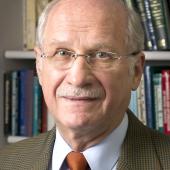
The Executive Board of the Program Committee invites a distinguished member of AIChE to present a comprehensive authoritative review of the chemical engineering science in his or her field of specialization. Selection criteria include:
- the quality and relevance of the accomplishments of the lecturer in the technical field likely to be the subject of the lecture
- the communication skills of the lecturer
- the value of the lecture to the meeting attendees and the members of the Institute
To honor Dr. John M. Prausnitz of the University of California, Berkeley's exceptional impact on the profession, society, and generations of chemical engineering students, AIChE’s Board of Directors has agreed to rename the Institute Lecture to the John M. Prausnitz AIChE Institute Lecture. The AIChE Foundation gratefully acknowledges the generosity of John’s closest peers who have made lead gifts to establish an endowment to support the Lecture and ensure John’s name will be recognized in perpetuity.
This is the 76th AIChE Institute Lecture.
Supported by the AIChE Foundation.
This year's John M. Prausnitz AIChE Institute Lecturer is Ignacio E. Grossmann, Rudolph R. and Florence Dean University Professor, in the Department of Chemical Engineering at Carnegie Mellon University.
Optimal Synthesis and Planning of Sustainable Chemical Process and Energy Systems
Ignacio E. Grossmann, Rudolph R. and Florence Dean University Professor, Department of Chemical Engineering, Carnegie Mellon University
In this lecture we give an overview on the applications of recent models and algorithms for the discrete and continuous optimization of a variety of challenging applications in the optimal synthesis and planning of sustainable chemical processes and energy systems. We provide an overview of applications of deterministic models based on mixed-integer linear/nonlinear programming (MILP/MINLP), Generalized Disjunctive Programming (GDP) and global optimization techniques, many of which have been developed by chemical engineers in the area of process systems engineering. We first consider applications of MILP in energy systems that include optimization of hydrogen supply chains, and the long term expansion planning of reliable and resilient electric power systems with high penetration of renewables. We also briefly discuss the retrofit of crude oil refineries for processing biomass to produce sustainable aviation fuels. Next, we consider applications of MINLP and GDP that include synthesis of lignocellulosic ethanol, optimization of shale gas infrastructures, and synthesis of intensified distillation columns. We consider next recent algorithms for rigorous global optimization of nonconvex optimization models for which we consider applications in optimal process water networks that involve reuse and recycle, optimal maritime transportation planning under carbon intensity constraints, and optimal design of centralized and distributed manufacturing facilities for biomass production. Finally, we briefly discuss extensions of these models to handle uncertainties. The variety of applications that we cover in this lecture, illustrates the scope that optimization techniques have towards the optimal synthesis and planning of sustainable chemical processes and energy systems.

